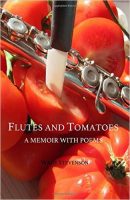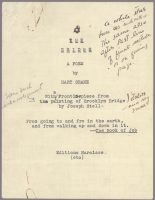July 21, 2015
Edited by David Sanders
Specimen Days
1664 — Matthew Prior, English poet, is born.
1717 — Niccolo Amenta, Italian poet (La Gostanza), dies.
1796 — Robert Burns, Scottish poet (Auld Lang Syne), dies at 37.
1821 — Vasile Alecsandri, Romania, poet/ Foreign Minister/diplomat, is born.
1831 — Emil Aarestrup, Danish physician/poet (Ritornellen), dies at 55.
1892 — Anton Schnack, German writer/poet, is born.
1899 — Hart Crane, US, poet (Bridge), is born.
1941 — Bohdan Lepky, Ukrainian writer and poet (b. 1872).
1967 — Pierre Kemp, Dutch poet (English paint box), dies at 80.
1974 — Willem F K Hussem, painter/poet (Steltlopen on Sea), dies at 74.
1996 — Macha Louis Rosenthal, critic/poet, dies at 79.

Exile
My hands have not touched pleasure since your hands, —
No, — nor my lips freed laughter since 'farewell',
And with the day, distance again expands
Voiceless between us, as an uncoiled shell.
Yet, love endures, though starving and alone.
A dove's wings clung about my heart each night
With surging gentleness, and the blue stone
Set in the tryst-ring has but worn more bright.
—Hart Crane (1899–1932)
“Love endures, though starving and alone.” —Hart Crane (1899–1932)
World Poetry
Russian Poet Sentenced over Poem in Support of Ukraine

A Russian court has convicted poet and teacher Alexander Byvshev of ‘inciting enmity’ and sentenced him to 300 hours of community service, confiscated his computer and prohibited him from working as a school teacher for two years. His ‘crime’ – the poem ‘To Ukrainian Patriots’ in which he expresses his opposition to Russia’s annexation of Crimea and suggests Ukrainians should ensure that not one inch of Crimea is handed “to Putin’s chekists”.
Ayatollah Ali Khanemei Vies for Control of the Poetry of the Islamic Republic

Ayatollah Ali Khamenei has issued a statement concerning the recent poetry of the Islamic Republic, which he finds deals only with “tivial themes.” The Ayatollah fears that “conspirators” are leading Iranian poets to misuse the art form. According to Khamenei, poetry should be “a weapon in the war of the Truth against Falsehood.” Therefore, the Supreme Leader, a fledgling poet himself, has provided Iranian poets with “a comprehensive plan for the further development of poetry in the Islamic Republic,” according to a recent article in Asharq Al-Awsat. Khamenei’s plan includes guiding poets back to the interests of their “epic revolutionary mission” and away from the ideals of a “corrupt culture.”
A Russian court has convicted poet and teacher Alexander Byvshev of ‘inciting enmity’ for writing a poem entitled ‘To Ukranian Patriots.’
Recent Reviews
Rare or Well-Done
by David Orr
“Two poetries are now competing,” Robert Lowell said in 1960, “a cooked and a raw.” The “cooked,” as Lowell saw it, was the university poetry of the midcentury, served on platters borrowed from Auden and sprinkled with croutons chipped from Eliot’s “Four Quartets.” This was “a poetry of pedantry” meant to be “digested by a graduate seminar.” “Raw” writing, on the other hand, involved “blood-dripping gobbets of unseasoned experience” offered up (again, as Lowell saw it) by the Beat poets for their coffeehouse constituency. This was crude stuff, “a poetry of scandal.”
Best New Poetry Collections for July
by Elizabeth Lund
Amy Gerstler’s “Scattered at Sea” (Penguin; paperback, $20) throws convention and familiarity overboard and asks us to consider what remains. The work mixes salty humor, invigorating rhythms and sharp-edged wisdom. Some people may blush when the language occasionally veers from bold to bawdy, as in the first poem, which begins: “Pardon this frontal offensive.”
Book Review: Some Slow Bees by Carol Potter
by Julia Shipley
Despite its evocative title, Some Slow Bees is not a book about colony collapse. Instead, Corinth resident Carol Potter's fifth collection of poems explores jokes, katydids, lizards and, yep, bees — slow bees, Do Bees and Don't Bees. And, as pollinators do in both literature and life, those busy creatures ultimately reveal clues about where we're going and where we've been. Winner of the 2014 FIELD Poetry Prize from Oberlin College Press, Potter fills her poetry with curious regard, affection, occasional annoyance and even exasperation at the bounty of life's detritus.
Work This Thing
by Elizabeth Willis

When something or someone is “in the wind,” it is fugitive, on the run. Poetry, by virtue of its adaptive vocality, the thrift of its economic footprint, is suited to being in the wind. But how does a poet turn that wind into a whirlwind, a revolutionary vortex? In many ways, Fred Moten’s work is devoted to fugitivity. The stance of his poems is grassroots revolutionary: undoing, by means of the everyday, the super-powerful default settings of a corporatized world and thereby reopening the case for what the work of poetry might look and feel like.
The stance of Fred Moten’s poems is grassroots revolutionary: undoing, by means of the everyday, the super-powerful default settings of a corporatized world.
Broadsides
Poetry and Politics in Iran
by Neima Jahromi
In 1965, after a trip through China and Japan, the Iranian modernist Sohrab Sepehri found his voice. It could be heard in a new poem he had written, called “The Sound of Water’s Footsteps.” Sepehri puzzles over his identity as a writer, as a Muslim, as a widely travelled painter, and as a man from Kashan, where, in the seventh century, according to legend, Arab invaders intent on spreading Islam subdued the poet’s home town by throwing scorpions over the walls. Sepehri muses on the space race and “the idea of smelling a flower on another planet,” and he writes in free verse, inspired by Nima Yushij, a kind of Ezra Pound figure in the history of modern Persian poetry, who was inspired by the poetic notions of French Symbolists.
Remembering James Tate (1943-2015)
Last week, the American poet James Tate passed away at the age of 71. Tate published over 20 books, won the Pulitzer Prize, and taught several generations of poets at the University of Massachusetts, Amherst. Partisan asked poets, critics, and editors, some of whom are former students of Tate's, to share a few sentences about the man and his work.
There has been an outpouring of memories since the recent passing of James Tate.
Drafts & Fragments
A Poem Becomes Meme. Forgive Me.
by Annie Lowrey
No really, do forgive me. If you are present on the internet — scrapbooking on Tumblr or, especially, tweeting on Twitter — you have probably seen this joke a lot lately, existing as it does in that snowballing space between “everyone making the same joke” and “full-on meme.”
Spectator Competition: a Lecherous poet gets his come-uppance (plus: Gove’s rules)
by Lucy Vickery
Given the kerfuffle caused by the recent publication of Craig Raine’s ‘Gatwick’ in the London Review of Books, I thought it might be interesting to invite competitors to compose their own poem about an encounter in an airport. Raine’s poem brought the Twitter bullies out in force to broadcast their disgust at an elderly poet sharing his lustful thoughts about young women. Fiona Pitt-Kethley’s submission imagines a scenario in which one of them wreaks her revenge.
The recent publication of Craig Raine’s poem ‘Gatwick’ caused a kerfuffle of sorts.
Poetry In the News
Yeats: Papers Confirm Bones Sent to Sligo were not Poet’s
There were doubts about the authenticity of WB Yeats’s bones even before they were transferred from France for reburial in Drumcliffe churchyard in September 1948. Aware that the poet’s remains had been scattered in an ossuary in 1946, Yeats’s friends attempted to dissuade his widow, George, from going through with the repatriation. At the ceremony in Co Sligo the poet Louis MacNeice protested that the shiny new coffin transported by the Naval Service was more likely to contain “a Frenchman with a club foot”.
Dante's Tomb Security Boost as Italy Fears Isis Attack

The tomb of Dante Alighieri, Italy's best-known poet, could be subject to an Islamic State-inspired attack, due to the depiction of the Prophet Muhammad in Dante's epic poem the Divine Comedy. Italian newspaper Il Giornale reported that Dante's tomb, which is in Ravenna in northeastern Italy, has been put on a list of possible targets of supporters of the group, and could now be subject to increased police presence.
Dante’s tomb has been put on a list of possible targets of supporters of ISIS, due to the depiction of the Prophet Muhammad in the Divine Comedy.
New Books
One Wide Expanse by Michael Longley
[Hardcover] University College of Dublin Press, 80 pp., $31.00
This is the first volume in The Poet's Chair series, which will publish the public lectures of the Ireland Professors of Poetry. The Ireland Chair of Poetry was established in 1998 following the award of the Nobel Prize of Literature to Seamus Heaney. In this volume, the distinguished Irish poet Michael Longley – whose poetry has transcended political and cultural boundaries throughout his career – reflects on what has influenced his craft.
Apollo in the Grass: Selected Poems by Aleksandr Kushner
[Hardcover] Farrar, Straus and Giroux, 112 pp., $24.00

For the Nobel laureate Joseph Brodsky, the poems of Aleksandr Kushner were essential: "Kushner is one of the best Russian lyric poets of the twentieth century, and his name is destined to rank with those close to the heart of everyone whose mother tongue is Russian.” Apollo in the Grass is the first collection in English translation of Kushner's post-Soviet poems, and also includes certain earlier ones that could not be published during the Soviet era.
First Words by Emily Vogel
[Paperback] NYQ Books, 84 pp., $14.95
From summer's blonde height of swarming sunlight, through autumns gentle falling, and into the dark spell of winter of 2012, Emily Vogel both endured and reveled in the pregnancy which brought her first child in early December of that year. The poems in this book trace the trajectory of the pregnant months and into the first year of her daughter, Clare Sophia's life. Some of these speak from underneath the tenuous surfaces of water where post-partum tendencies ensue, and some from the overwhelming joy of having given birth, as in relation to her husband, who gave the seed for the blessing of life, and also in the transformation of the new mother-skin. These poems are about a shifting in perspective and identity, and about growth and renewal, both in the world, and within the self.
Flutes and Tomatoes: A Memoir with Poems by Wade Stevenson
[Paperback] BlazeVOX, 102 pp., $12.00

“Flutes and Tomatoes” by Wade Stevenson is a compelling story of survival, love and resilience in the face of loss. Filled with a crackling energy these poems describe self-discovery, worldly discovery, and the discovery of the mutability of time that shapes the world through the ever-distancing, ever expanding waves of disorder and randomness that are left behind after the death of a loved one. The howling emptiness of hunger runs through these poems like a river washing through a chasm. Stevenson invites us to look deeply into hunger, to take the empty spaces back so that we may find a gift of sorts in the beauty formed from music made upon the places where distress has made the foundations of grief into walls.
For the Nobel laureate Joseph Brodsky, Aleksandr Kushner’s poetry was essential: “Kushner is one of the best Russian lyric poets of the 20th century.”
Correspondences
12 or 20 (second series) Questions with Marie Buck

Marie Buck is the author of the poetry collections Life & Style (Patrick Lovelace Editions, 2009) and Portrait of Doom (Krupskaya, 2015), and she teaches literature and writing in Brooklyn. Some of her recent poems appear in Poems By Sunday, a Perimeter, and Fanzine.
Good Literary Citizens: An Interview with Ladan Osman
by Alex Dueben

The past two years have been eventful for Ladan Osman. Last year, her chapbook, Ordinary Heaven, was selected for inclusion in the box set Seven New Generation African Poets, a project of the African Poetry Book Fund, and she received the 2014 Sillerman First Book Prize for African Poets for her manuscript The Kitchen-Dweller’s Testimony, which was published in April by the University of Nebraska Press.
Ladan Osman’s recent publications include her chapbook ‘Ordinary Heaven’ and her first full-length collection ‘The Kitchen-Dweller’s Testimony.’
Envoi: Editor’s Notes
Lessons from the Past: Hart Crane
to Waldo Frank
20 June 1926
(from the Isle of Pines, Cuba)
[This was written just before Crane began work on The Bridge; these are the objections that he must actively counter if he is to begin his poem]

The form of my poem rises out of a past that so overwhelms the present with its worth and vision that I’m at a loss to explain my delusion that there exist any real links between that past and a future worthy of it. The "destiny" is long since completed, perhaps the little last section of my poem [i. e., various drafts of what would become "Atlantis"] is a hangover echo of it – but it hangs suspended somewhere in the ether like an Absalom by his hair [rebellious Absalom was killed by loyalist Joab when his hair became entangled in a tree]. The bridge as a symbol today has no significance beyond an economical approach to shorter hours, quicker lunches, behaviorism and toothpicks. And inasmuch as the bridge is a symbol of all such poetry as I am interested in writing it is my present fancy that a year from now I’ll be more contented working in an office than ever before. Rimbaud was the last great poet that our civilization will see – he let off all the great cannon crackers in Valhalla’s parapets, the sun has set theatrically several times since while [Jules] Laforgue, Eliot and others of that kidney have whimpered fastidiously. Everybody writes poetry now – and "poets" for the first time are about to receive official social and economic recognition in America. It’s really all the fashion, but a dead bore to anticipate. If only America were half as worthy today to be spoken of as Whitman spoke of it fifty years ago there might be something for one to say – not that Whitman received or required any tangible proof of his intimations, but that time has shown how increasingly lonely and ineffectual his confidence stands.
—from O My Land, My Friends: The Selected Letters of Hart Crane, edited by Langdon Hammer and Brom Weber
“The form of my poem rises out of a past that so overwhelms the present with its worth and vision that I’m at a loss to explain my delusion.” – Hart Crane